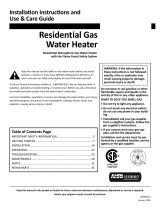
Residen al Standard Gas Water Heater Use and Care Guide • 5
SAFETY
Residen al Standard Gas Water Heater Use and Care Guide • 5
IMPORTANT SAFETY INFORMATION
• If the water supplied to the water
heater is pre-heated (for example,
by a solar system) the temperature
in the tank may be higher than the
water heater’s temperature se ng.
• Should overhea ng occur or the
burner fail to shut off , turn off the
manual gas supply valve to the water
heater and call a qualifi ed person.
To reduce the risk of unusually hot wa-
ter reaching the fi xtures in the house,
install Thermosta c Mixing Valves at
each point-of-use.
If anyone in your home is at par cular
risk of scalding (for example, the elder-
ly, children, or people with disabili es)
or if there is a local code or state law
requiring a certain water temperature
at the hot water tap, these precau ons
are par cularly important.
According to a na onal standard (ASSE
1070) and many local plumbing codes,
the water heater’s gas control valve
should not be used as the sole means
to regulate water temperature and
avoid scalds.
Properly adjusted Thermosta c Mixing
Valves installed at each point-of-use al-
low you to set the tank temperature to
a higher se ng without increasing risk
of scalds. A higher temperature se ng
allows the tank to provide much more
hot water and can help provide proper
water temperatures for appliances such
as dishwashers and washing machines.
Higher tank temperatures (140°F)
also kill bacteria that cause a condi-
on known as “smelly water” and can
reduce the levels of bacteria that cause
water-borne diseases.
Water Contamina on Risk
Do not use chemicals that could con-
taminate the potable water supply. Do
not use piping that has been treated
with chromates, boiler seal, or other
chemicals.
Fire Risk
This water heater is
equipped with a Flam-
mable Vapor Igni on
Resistance (FVIR) system.
FVIR is designed to reduce the risk of
fl ammable vapor-related fi res. FVIR
makes this product more sensi ve to
installa on errors or improper installa-
on environments. The FVIR system will
not prevent a possible fi re/explosion if
the igniter is depressed and fl ammable
vapors have accumulated in the combus-
on chamber with the pilot light off .
Do not a empt to light this appliance,
or depress the igniter bu on, if you
suspect fl ammable vapor have accumu-
lated inside or outside the appliance.
Immediately call a qualifi ed person to
inspect the appliance. Water heaters
subjected to a fl ammable vapors inci-
dent will show a discolora on on the
fl ame arrestor and require replacement
of the en re water heater. Improper
installa on or an inadequate air supply
can also cause the FVIR system to dis-
able the water heater.
WARNING! This water heater has a
rese able thermal switch installed as
part of the FVIR system. Do not
a empt to disable or modify this
feature in any way. Doing so can lead
to fi re, explosion or excessive and
abnormal produc on of carbon
monoxide.
To reduce the risk of a fi re that could
result in property damage, or serious
injury or death:
• Do not store things that can burn
easily such as paper or clothes next
to the water heater.
• Do not store or use gasoline or other
fl ammable substances in the vicinity
of this or any other appliance.
• Keep the water heater from becom-
ing wet. Immediately shut the water
heater off and have it inspected by a
qualifi ed person if you fi nd that the
wiring, thermostat(s) or surround-
ing insula on have been exposed
to water in any way (e.g., leaks from
plumbing, leaks from the water
heater itself can damage property
and could cause a fi re risk). If the
water heater is subjected to fl ood
condi ons or the thermostat(s) have
been submerged in water, the en re
water heater must be replaced.
• Replace the water heater’s viewport
if glass is missing or damaged. Repair
the combus on chamber door seals
if damaged.
Explosion Risk
High temperatures and
pressures in the water
heater tank can cause an explosion re-
sul ng in property damage, serious in-
jury or death. A new Temperature and
Pressure (T&P) Relief Valve is included
with your water heater to reduce risk
of explosion by discharging hot water.
Addi onal temperature and pressure
protec ve equipment may be required
by local codes.
A na onally recognized tes ng labo-
ratory maintains periodic inspec on
of the valve produc on process and
cer fi es that it meets the requirements
for Relief Valves for Hot Water Supply
Systems, ANSI Z21.22. The T&P Relief
Valve’s relief pressure must not exceed
the working pressure ra ng of the wa-
ter heater as stated on the ra ng plate.
Maintain the T&P Relief Valve properly.
Follow the maintenance instruc ons
provided by the manufacturer of the
T&P Relief Valve (label a ached to T&P
Relief Valve). An explosion could occur




















